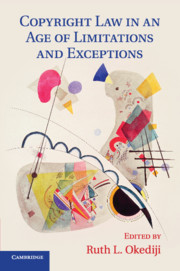Book contents
- Copyright Law in an Age of Limitations and Exceptions
- Copyright Law in an Age of Limitations and Exceptions
- Copyright page
- Dedication
- Contents
- Author Biographies
- Preface
- Introduction
- 1 Justifications for Copyright Limitations and Exceptions
- 2 The Role of the Author in Copyright*
- 3 A Few Observations about the State of Copyright Law
- 4 Fetishizing Copies
- 5 Copyright in a Digital Ecosystem
- 6 The Canadian Copyright Story
- 7 (When) Is Copyright Reform Possible?
- 8 Fair Use and Its Politics – at Home and Abroad
- 9 Flexible Copyright
- 10 The Limits of “Limitations and Exceptions” in Copyright Law
- 11 Lessons from CopyrightX
- 12 Rights on the Border: The Berne Convention and Neighbouring Rights
- 13 How Oracle Erred
- 14 Reframing International Copyright Limitations and Exceptions as Development Policy
- Index
8 - Fair Use and Its Politics – at Home and Abroad
Published online by Cambridge University Press: 07 June 2017
- Copyright Law in an Age of Limitations and Exceptions
- Copyright Law in an Age of Limitations and Exceptions
- Copyright page
- Dedication
- Contents
- Author Biographies
- Preface
- Introduction
- 1 Justifications for Copyright Limitations and Exceptions
- 2 The Role of the Author in Copyright*
- 3 A Few Observations about the State of Copyright Law
- 4 Fetishizing Copies
- 5 Copyright in a Digital Ecosystem
- 6 The Canadian Copyright Story
- 7 (When) Is Copyright Reform Possible?
- 8 Fair Use and Its Politics – at Home and Abroad
- 9 Flexible Copyright
- 10 The Limits of “Limitations and Exceptions” in Copyright Law
- 11 Lessons from CopyrightX
- 12 Rights on the Border: The Berne Convention and Neighbouring Rights
- 13 How Oracle Erred
- 14 Reframing International Copyright Limitations and Exceptions as Development Policy
- Index
Summary
The chapter “Fair Use and Its Politics – at Home and Abroad” explores how the United States’ fair use doctrine – a “standard” in a world of statutory copyright rules – has become an arena of ideological struggle over intellectual property policy.
At the international level, this debate frequently plays out in terms of how 17 U.S.C. § 107 meets or fails the “three-step test” of Berne and TRIPS. The chapter reasons that asking whether section 107 complies with the three-step test is asking the wrong question: section 107 structure is not an exception – it is a mechanism to establish particular exceptions. When the fair use doctrine works properly, it produces discrete de facto exceptions, such as a parody exception following Campbell or intermediate copying exception for software following Sega and Connectix. Section 107 is almost certainly “compliant” with the three-step test; it is particular applications of the doctrine that might be attacked in the future as failing the three-step test. The chapter also describes how fair use has proliferated – in different permutations – to other jurisdictions as well as why the United States does not – and should not – strenuously lobby other countries on whether or not to adopt fair use-style mechanisms.
- Type
- Chapter
- Information
- Copyright Law in an Age of Limitations and Exceptions , pp. 234 - 274Publisher: Cambridge University PressPrint publication year: 2017
- 5
- Cited by



